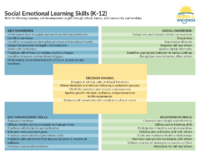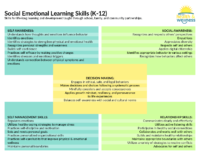DATE:
October 28, 2021
TO:
Principals
FROM:
Michael Anderson, Associate Superintendent
Travis Hamblin, Director of Student Services
McKinley Withers, Health and Wellness Consultant
SUBJECT:
Infusing Intentional Social Emotional Learning
We are so lucky to work in education! Our essential, meaningful work is laid out in front of us: to prepare our students for a successful, thriving life in adulthood. When a student is dysregulated (upset/crying/afraid), they cannot access the part of their brain they need to think, complete tasks, process rewards and consequences, or reason. As learners, it is their job to make mistakes. It is their job to get dysregulated so we can support them in learning how to appropriately regulate themselves.
Social and emotional skills are absolutely essential for success. Most “bad” behavior happens because kids don’t yet know another way to deal with a particular situation or how to be in control of their impulses. These skills have to be learned! Often we see these skill deficits as “bad” behavior. Consider this: Listening is a skill that has to be learned through practice. Calming down is a skill that has to be learned and practiced...the list goes on!
The brain considers safety the number one priority at all times! And guess where most of the danger is these days? Not out in the jungle with the lions. Not with the bears. The danger is here at school. It’s learning how to be part of the social world. It’s the fear of getting in trouble, or failing at something that others find easy. It’s the stress of having to learn and pass tests and follow rules. It’s hard and every student needs an environment where they can practice the skills necessary for navigating their world.
Please review the attached Social and Emotional Learning Skills document to familiarize yourself with the "skills" we will discuss. Prior to next week's principals meeting, please complete the following skill "pre-assignment":
Say It Out Loud
- When you use a skill in your everyday work (or fail to use a skill), say it out loud!
- Intentional social and emotional learning starts with noticing. Verbalizing your skills in front of students helps you AND your students grow their social and emotional competence. Some examples could be, "I was feeling a little bit frustrated and I took a minute to calm down," "I am writing this down on a sticky note to make sure I follow through."
- When you notice a student using a skill, say it out loud! Having their use of skills be reinforced (no matter how small) helps them on their journey of social and emotional development. Some examples could be: "I noticed that you stated your feeling," "I can see you are breathing slowly to calm down." You'll know it when you see it and taking a few minutes to notice helps!



